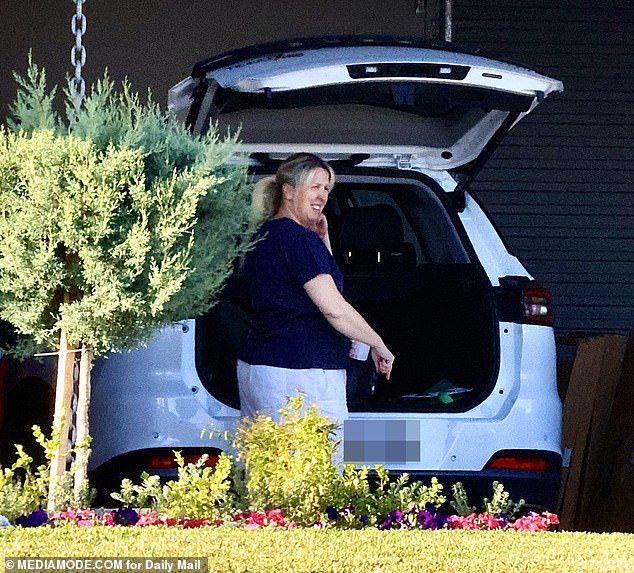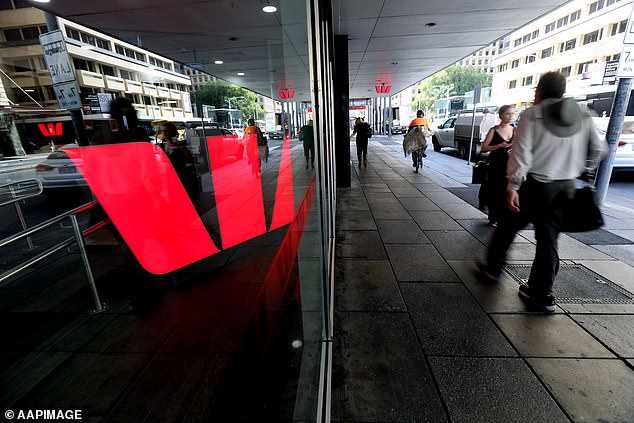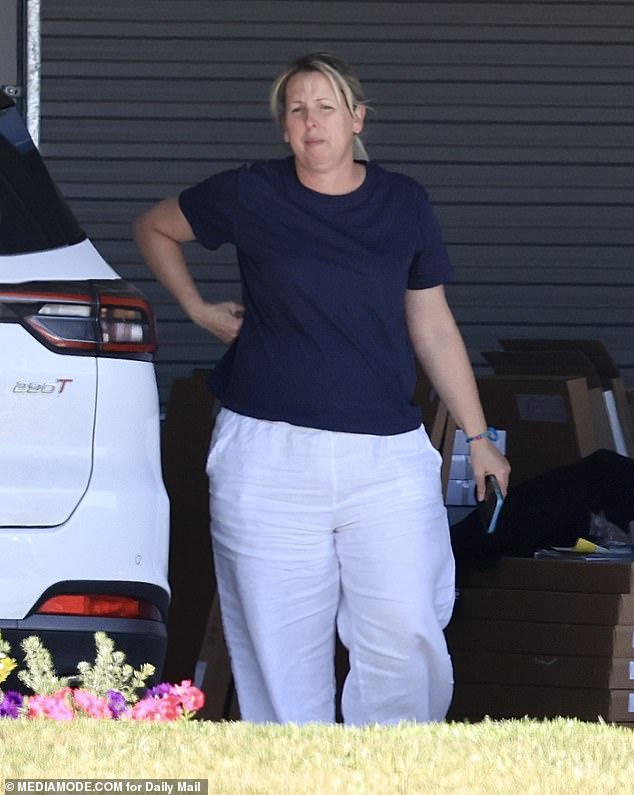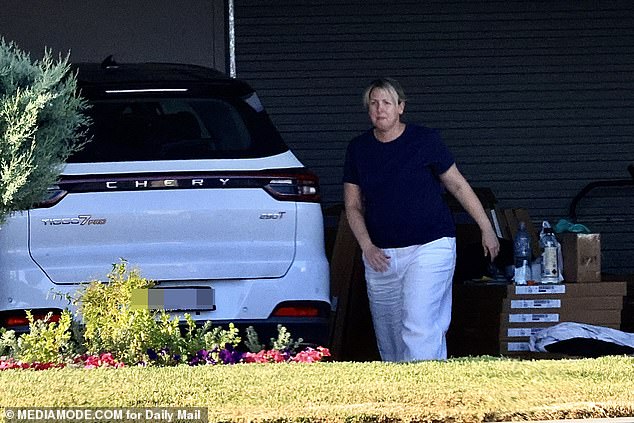Longtime Westpac employee Karlene Chandler won a landmark case against the bank over her right to work from home so she could care for her children.
During a day’s work on Friday, she left her home on a new estate 80km south-west of Sydney only twice – to ferry her six-year-old twin daughters to and from school.
Ms Chandler’s husband Brett answered the doorbell of the four-bedroom house when the Daily Mail rang after the second car journey.
He said his wife would not be publicly discussing her win against Westpac and directed inquiries to the Finance Sector Union.
‘We’re not going to make any comment on it,’ he said. ‘We’re just keeping our head down, bum up, just so we don’t antagonise anyone.’
A Fair Work Commission ruling which granted Ms Chandler the right to work from home has ignited a storm of debate across Australia, exposing deep divisions over the future of flexible work.
Ms Chandler, a Westpac employee for 23 years, requested to work from home so she could manage school drop-offs and collection and care for her twins.
The Chandler family moved to Wilton in the Wollondilly Shire in 2021 to be closer to a private school but ended up further away from Westpac offices.

Karlene Chandler won a landmark case against Westpac after the bank refused to let her work from home five days a week. She is pictured on Friday after picking her children up from school

During a day’s work on Friday, Ms Chandler left her home on a new housing estate 80km south-west of Sydney only twice, to ferry her six-year-old twin daughters to and from school
Mr Chandler works long hours across NSW and interstate while it took two hours to travel from the school to Ms Chandler’s office from their new home.
Westpac denied Ms Chandler’s request, arguing her lengthy commute was a consequence of personal choices and would negatively affect business operations.
The bank insisted she attend its Kogarah office, 70km from Wilton, at least two days a week under its hybrid work policy.
Ms Chandler then proposed a compromise, offering to do her in-office days at a Westpac branch in Bowral, 40km from Wilton, but that was also rejected.
In response, Ms Chandler challenged the decision under the Fair Work Act’s flexible work provisions, which apply to specific groups including parents of school-aged children and individuals over 55.
Deputy President Tom Roberts ruled in Ms Chandler’s favour, stating there was no doubt she could perform her role entirely remotely as she had done it successfully for four years.
Mr Roberts concluded Westpac not only failed to genuinely consider the request, but also lacked reasonable business grounds to reject it.
The ruling could pave the way for stronger remote work entitlements, placing greater weight on individual circumstances over corporate preferences when roles are demonstrably suited to online delivery.

Ms Chandler’s win against Westpac is being hailed as a significant outcome for working parents and may set a precedent for future flexible work disputes, a union said
The Finance Sector Union also warned the decision may have far-reaching consequences for large employers seeking to enforce rigid return-to-office mandates.
The ruling set off a flood of public debate, with thousands weighing in online.
While supporters say the decision is a victory for work-life balance, critics warn it could backfire, fuelling job cuts, offshoring, and declining productivity.
‘Everyone that works from home says the same thing, “I work harder”, but visit them during work hours and they’re doing house chores,’ one commenter claimed.
A recurring concern was that remote roles could be outsourced to cheaper overseas labour.
‘If she can do her job remotely, they’ll give it to someone cheaper overseas. She just shot herself in the foot,’ another said.
Others argued working from home deepens inequality, particularly for younger staff who miss out on mentorship, and for frontline workers, nurses, truck drivers and teachers, who don’t have that option.
Some claimed the case sent a dangerous signal about ‘motherly entitlement’.

A Fair Work Commission ruling granting Ms Chandler the right to work from home has ignited a storm of fury across Australia, exposing deep divisions over the future of flexible work
‘What she’s done is make employers rethink hiring women,’ one woman argued. ‘They already assume we’ll go off and get pregnant – now they’ll think we’ll demand to work from home.’
But others strongly defended Ms Chandler’s stance.
‘We complain about migration but love to make things hard for mums,’ one commenter said.
‘WFH gives parents an extra few hours a day for their kids. Families are less rushed and less stressed. It’s good for society.’
Another argued flexible work could even help reverse Australia’s falling birth rate: ‘If we show girls a manageable version of motherhood, they might see they don’t have to choose between a career and children.’
Critics said Ms Chandler’s commute was her choice, but others countered that skyrocketing housing costs force many Australians to live far from their workplaces.
‘With housing the way it is, most people can’t afford to live near the CBD. It’s not a lifestyle choice, it’s a financial necessity,’ one person wrote.
Others pointed out WFH can boost productivity through fewer distractions and shorter commutes.

The Chandler family moved to Wilton in Wollondilly Shire in 2021 to be closer to a private school but ended up further away from Westpac offices
One worker said: ‘I’m more productive at home, no randoms at my desk, no traffic, no exhaustion. I work longer hours and my employer gets more out of me.’
Beyond the legal implications, the debate also revealed generational rifts.
‘They (Boomers) haven’t been employed since 1988 and are stuck in that mindset… Technology has come a long way. I’m monitored to within an inch of my life and still get my work done,’ one commenter said.
Another wrote: ‘Running a business isn’t about how many people are in an office. Only dinosaurs think productivity equals presence.’
But recruitment expert Tammie Bayliss said the tide has already turned against remote work and that fewer employers were hiring staff for remote work jobs.
‘Work-from-home jobs are disappearing,’ she said. ‘Since the pandemic ended, fewer employers are offering hybrid options.’
Major corporations including Amazon, Dell, Tabcorp and Flight Centre have already ordered staff back to the office full-time.
‘People have taken the p***, to be quite frank, and big companies want them back… If you want a remote job, start your own business,’ Ms Bayliss said.
She added that rising unemployment and a tightening job market mean workers now have less leverage.
‘Two years ago, I’d have said differently – but in 2025, work-from-home jobs are becoming rare… If people quit because they’re losing WFH days, there’ll be plenty lining up to replace them.’
